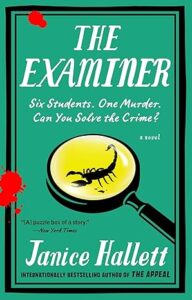Playing Detective with Epistolary Fiction
by Savannah Winkler, Adult Services Librarian

One of my favorite parts of reading mystery books is getting to play detective. I have always enjoyed the classics, like Agatha Christie or Sherlock Holmes, where I feel like I’m cracking the case from my couch. Within the last year, I also discovered that I enjoy a good epistolary novel. If you’re not familiar with epistolary novels, these books don’t tell stories in the usual way. Instead, they unfold through emails, texts, transcripts, photos, and other “found” documents. This makes you the one sorting through the clues. You’re not just reading—you’re investigating. So, if you’re like me and love the thrill of piecing together a puzzle, you might enjoy these epistolary mysteries.
Janice Hallett has written a handful of mystery novels that use an epistolary format. The first of hers that I read was “The Mysterious Case of the Alperton Angels.” This book opens with you, the reader, discovering a safe deposit box filled with documents. You are instructed to read them and then make a decision: destroy them or take them to the police. The story that follows is told through those documents including email, text messages, transcripts, and more. The documents reveal information about the Alperton Angels, a cult that believed a newborn was the anti-Christ. Decades after the cult’s crimes, writer Amanda Bailey is determined to find the Alperton baby, now eighteen years old. However, as she searches, Amanda realizes that the dark story of the Alperton Angels isn’t the whole truth. Unfortunately, the events surrounding the cult are even worse than she could have imagined.
Following the “Alperton Angels,” I checked out Hallett’s other epistolary novels. “The Appeal” was equally as fun and unpredictable. This story follows The Fairway Players, a diverse group of community members that participate in the local theatre. Tragedy befalls the group’s director, Martin Hayward, when his granddaughter is diagnosed with a rare form of cancer. The acting group rallies together to start raising money for the Hayward family. However, disagreements and tensions arise, and a dress rehearsal takes a sudden and explosive turn. Then something even worse occurs, and the body of one actor is discovered.
After “The Appeal,” I also picked up Hallett’s 2024 release, “The Examiner.” This book had a twist that actually made me gasp out loud. The story tells yet another murder mystery through the multimedia. This time, the characters are a group of six students as they work on an art degree. The camaraderie of the group is doomed from the start. Throughout the book you get to read their class group chats and assignments, which are filled with obvious disagreements and distrust. The situation escalates as students steal from one another and vandalize each other’s projects. When the class’s external examiner arrives, he begins to believe that one of the students has been murdered. But who, and why?
After finishing all of Hallett’s books, I still had the itch for more mysteries that followed a similar format. I recently discovered a Japanese author named Uketsu. Uketsu is a well-known horror Youtuber in Japan, and part of their intrigue is that no one knows their real identity. Uketsu recently started publishing novels, and those have been translated into English. Their first novel is “Strange Pictures.” As the title suggests, the story’s mystery unfolds through a series of pictures. Although on the surface the pictures seem unrelated, a macabre series of events connects them all. Uketsu’s second novel, “Strange Houses,” follows a similar premise. This time, the story centers on an unusual house. While it seems perfect on the outside, it turns out to be anything but. Images of the house’s floor plan reveal mysterious spaces and hidden rooms. Both of Uksetsu’s books invite the readers to think critically and try to figure out the mystery.
If you’d prefer a mystery that follows a slightly more traditional format, I also recommend “Penance” by Eliza Clark. A decade after the events occurred, journalist Alec Z. Carelli investigates the murder of sixteen-year-old Joan Wilson. Joan was murdered in the seaside town of Crow-on-Sea by three of her high school classmates. Little is known about the girls or why the murder occurred. As Alec investigates, he uncovers a complicated community and a disturbing internet culture. “Penance” is an impactful mystery told through podcast transcripts, interviews, and Alec’s own unreliable narration.
All these titles and more are available for checkout at the Manhattan Public Library. And if you’d like to know more about what others are reading, consider attending the library’s “Donuts and Danger” book discussion. The next discussion will be on September 25th from 6:30 – 8:30 p.m. in the library’s auditorium.
Manhattan Public Library is a cornerstone of free and equal access to a world of ideas and information for the Manhattan, Kansas, community. Learn more at mhklibrary.org.

